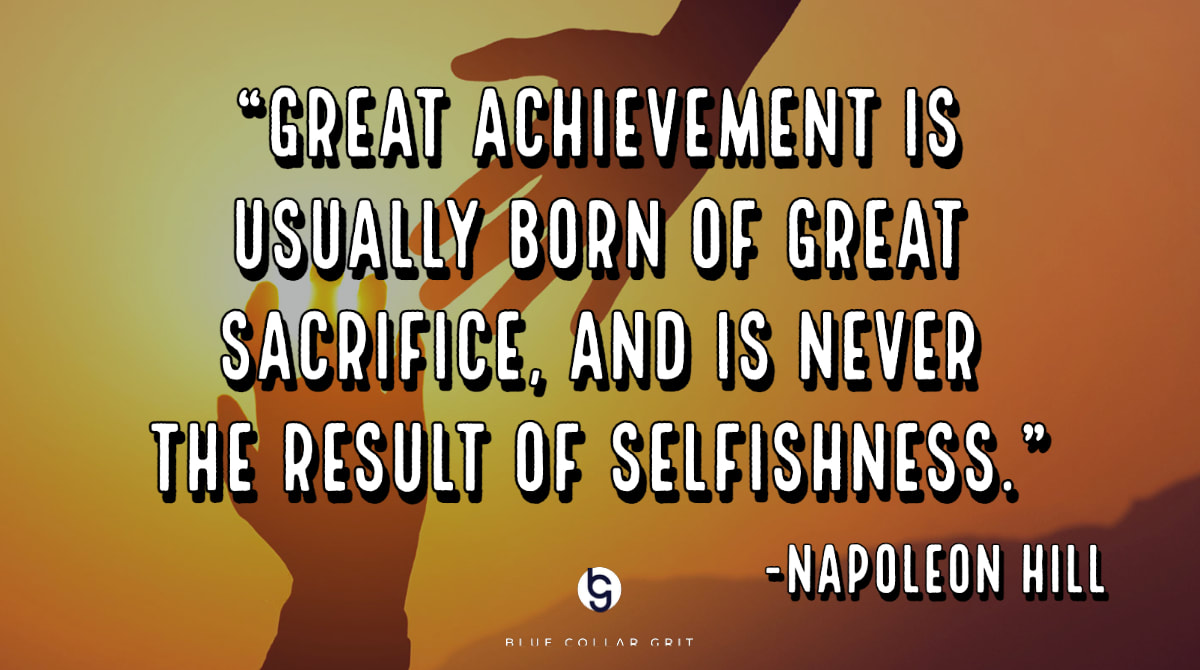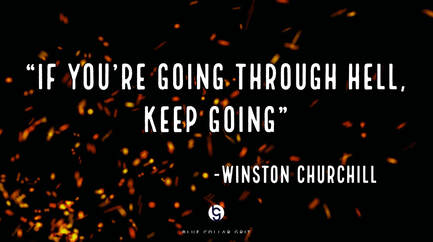Tournament LentEach season as we begin tournament play, we have a team meeting designated to something we call ‘tournament lent’. Lent is the religious observance of the 40 days Jesus spent fasting in the desert prior to beginning his public ministry. Lent represents discipline and sacrifice.
Our tournament lent discussion centers on one question: what are you willing to give up for the team? It’s a central question we all must ask ourselves. The degree to which we are willing to sacrifice determines our commitment level to anything. Spoken, or unspoken, everyone within our team knows what they are, and are not, willing to sacrifice. In anything we do, we are always limited by one thing: what we are willing to sacrifice. It’s not what we want, not what we dream about, and not even what we work for that we accomplish. It’s always a matter of what we are willing to give up. Sometimes it’s our time. Sometimes it’s our money. Sometimes it’s our ego. But, rest assured nothing is free. Nothing. Why Should We Care? What our players are willing to give up is always telling to the commitment level of the group. This year, one of our seniors went first and gave up his cell phone for the time we are in the tournament which could be up to a month. He cited all the time he wastes on his phone scrolling and how distracting that is. He talked about his desire to be more present with his teammates and how much he cherishes the time they have remaining together. He wants to use his newly claimed time to watch more film, prepare for games, and interact with his family and team. Clearly, his commitment is strong. The level of this commitment does not go unnoticed by teammates. Whether we realize it or not, we are constantly communicating our commitment to the team through the sacrifices we are willing to make. This is precisely why tardiness or absences are so damaging to a team. It’s not because of the lack of attendance, it’s the message that what we are doing isn’t really that important. I’m not willing to sacrifice my time for our time. As much as this applies to our teams, it’s just as applicable to us as individuals. We make commitments to ourselves all the time that we break. Each time we compromise our word to ourselves we are selling our own stock. The sacrifices we choose to make in our lives are clear indications of our priorities. They are much more telling than what we dream of or even say. Each day we make choices in which we are prioritizing one thing over another. We think we are choosing what we want, but it’s more accurate to think of it as choosing what we are willing to do without. REAL TALK - Action Steps The idea behind tournament lent is to allow our guys to re-evaluate their commitment to our season then pledge to sacrifice something they enjoy to symbolize their commitment. It’s not perfect, but it does provide several opportunities to better understand the connection between what we want and what we are willing to sacrifice. Here are a few things we try to address each season.
Tournament lent is our way of highlighting the connection between what we want and what we are willing to sacrifice for. The reality is that we don’t get what we want. We get what we are willing to sacrifice for - nothing more and nothing less. For more information on building excellence in your teams, visit us at www.bluecollargrit.com. We would love to know how we could help!
1 Comment
Competitive EnduranceIn athletics there is a belief in the idea of certain people being ‘gamers’. ‘Gamers’ are players who seem to raise their level of performance in games. There is an unspoken undertone to the idea of a ‘gamer’ conveying a lack of work or preparation.
I’ve found one of two things to be true. Either the player has invested the time, energy, and effort to perform in those moments or he is consistently inconsistent yet garners the tag of a gamer for those flashes of brightness. If he hasn’t put in the work, the inconsistency will show it. Talent will flash brightly for moments but won’t persist without the foundation of work. Confidence in one’s self will help, but can’t make up for what isn’t truly there. It always comes back to the work. If he’s put in the work, few people consider him a 'gamer'. A lot of other adjectives may apply, but 'gamer' isn’t typically one of them. It would be disrespectful to a worker to be called a 'gamer'. It trivializes all the progress between games. For workers, the game is simply a test, not the objective. Becoming is the objective. Not so much to someone that fancies himself a 'gamer'. Why Should We Care? The work never lies. Never. It’s just a matter of when. This is where competitive endurance becomes a factor. Are you willing to persist until? That’s the question. For most, the answer is no. If we are only willing to compete when things go our way, or when we feel good, we’re just not very good. The days when the stars align, we may be brilliant. But, those random great performances are overshadowed by our glaring inconsistency and the fact that no one can truly count on us. Then we have the legion of mediocrity. As lovers of the comfort mediocrity provides, we hesitate to stretch ourselves too much. However, we do see the value in fitting in and being part of a group so we will make reasonable sacrifices and exit our comfort zone when necessary. Neither of these groups touch competitive endurance. Competitive endurance does not ensure great performance. It doesn’t guarantee the results we want. Competitive endurance means we never waiver in our commitment to the process, to what we do. When we embrace competitive endurance we accept the reality of miniscule progress. And, we’re relentless in our focus on that progress. Frustrations and disappointments certainly occur, but they are nothing more than parts of the process to be experienced, pushed past, and reflected on for growth. REAL TALK - Action Steps Competitive endurance is the life blood of persistence. Our willingness to continue competing in all circumstances, all environments, and in the face of countless plausible excuses will define our excellence or lack thereof. Here are a few ideas of maintaining yours.
If running a marathon were competitive endurance, those only willing to compete when they feel good could be represented by a walk to the fridge. They are not remotely close to the same things. Excellence is a marathon. For more information on building excellence in your teams, visit us at www.bluecollargrit.com. We would love to know how we could help! Win or Go HomeWinning matters, or should I say striving matters.
I know I’ve talked at lengths about how much more important the process is than the outcome. Although the emphasis on winning may sound counterintuitive, hear me out on this. It’s an important aspect of excellence that is often ignored. Teams are created to do something individuals are unable to do on their own. When we are competing within our team, the goal should be to help the team perform at its very best. The primary competitor isn’t the opponent, it’s ourselves. How far can we push and stretch ourselves in that moment? This is the competition. It is personal and collective. The competition is always internal, against ourselves, not against an opponent. The opponent is important, however. They provide friction that highlights and pushes our boundaries. This is where winning becomes important. Striving to win thrusts us out of our comfort zone, into a whole new arena of growth. The word strive is important. ‘Try’ is not enough. Why Should We Care? Strive means ‘to make great efforts to achieve or obtain something; to struggle or fight vigorously’. The pursuit of winning demands striving. And, it’s the striving that provides the growth and fulfillment we are all pursuing. It seems obvious that everyone is trying to win, which is generally true. Most people engaged in any competition want, and try, to win. As a matter of fact, there’s a growing number of people completely comfortable with the mediocrity of simply trying. For some, it’s become enough to try. Here’s the problem with trying: it ain’t striving. If we’re committed to trying we’ll show up, we’ll work about as hard as the people around us, we’ll win some and we’ll lose some. We’ll listen to the comforts of those around us when we fail, awarding us with half-hearted praise like ‘at least you tried’. Then, at some point, we’ll look in the mirror and know the truth. We left something on the table. We had more to give that we chose not to. We decided our comfort was more important than what the challenge required. We decided to try rather than strive. If we’re committed to striving we do more than show up, we attack opportunity in front of us. We don’t consider how hard the people around us are working, we do whatever is necessary to complete the task in front of us. We don’t hear the comforts or criticisms from those outside our arena, we’re too busy pursuing our best. Then, when we look in the mirror, we know the truth. The table is clear, there is nothing left to give. We chose our goals over our comfort, our team over ourselves. Striving produces fulfillment. REAL TALK - Action Steps I’m not supporting a win at all cost approach. But, I am suggesting that the willingness to do whatever it takes to win separates us now more than ever. Here are a few thoughts on maintaining perspective in your striving.
The willingness, and desire, to do what it takes to win is a talent. The constant strain of striving is not something many are willing to consistently choose. But, what an advantage for those that do. For more information on building excellence in your teams, visit us at www.bluecollargrit.com. We would love to know how we could help! Follow My LeadA quick Google search on the two topics sets this discussion up perfectly. Searching for books on “leadership” approximately 1.3 million results are found. A search for books on “followers” produces only 300 million. That’s about one fourth of the leadership results.
It’s interesting because there is no leadership without people to lead. And, it seems, most leaders are leading numerous people, not just one. So, why such a difference in the interest of leading and following? Why are there fewer books on being a good follower as compared to a good leader? Why are people so much less interested in following than leading? Good questions because if we want to lead, we need to know how to follow. As a matter of fact, we can’t truly lead if we can’t, or aren’t willing to, follow. Followers are first and foremost, humble. They realize they need help and are willing to accept whatever role is necessary to accomplish the goal. They care more about the team accomplishing their goal than about who gets the credit. And, perhaps most importantly, they care deeply about the mission of the team. So much so that they want to serve the most in areas of their strengths and allow others to do the same. Kind of sounds like the mindset a leader should have, don’t you think? Why Should We Care? Leadership has been glorified over the years in part due to the connection with corporate positions such as president and CEO. At many companies these people are viewed as the ultimate leaders within that organization. And, while that may be true, the idea that they are always leading and never following couldn’t be further from the truth. If they’re good anyway. Leading and following are inseparable. You can’t lead without followers but you also can’t lead without following. The reason is very simple. Both require the exact same critical behavior. The higher it is, the better we are at both. We can’t be excellent in either facet without it. It’s humility. The best leaders demonstrate this humility by empowering those they lead through autonomy within their role. They allow their people to lead within their area of expertise and while they become the avid follower doing whatever they can to help. Excellent leaders don’t micromanage. They guide and support. They serve and empower. Think of it like building a house. A great building manager is going to hire someone to frame the house, someone to pour the foundation, someone to roof it, someone to do the plumbing, someone to paint it … while the building manager is the leader of the project he must follow the advice and lead of each individual contractor within the project. His ability to be a great follower within each piece of the project will ultimately determine the success of the build. If he were to try to lead in all aspects of building the house, the job would be inefficient and suffer greatly from the missing care and investment of each individual contractor. REAL TALK - Action Steps We like to think that as leaders, we only lead but it’s just not true. If we are unable, or unwilling, to follow then we are compromising our potential. Here are a few ideas to be sure you are not only leading but also following.
Leadership is about bringing out the best in our teams. To think that avenue always runs through us is arrogant and ignorant. We need both the courage to lead and the humility to follow. For more information on building excellence in your teams, visit us at www.bluecollargrit.com. We would love to know how we could help! |
About bcI'm a teacher, coach, and parent seeking excellence while defining success on my own terms. Archives
April 2024
Categories |





 RSS Feed
RSS Feed